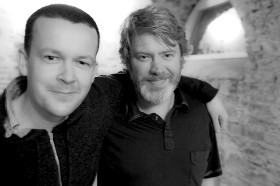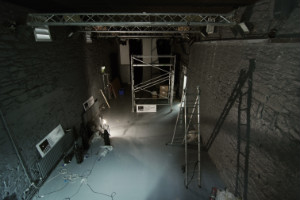The newly-refurbished Triskel Arts Centre in Cork city officially opened its doors last week. The venue, which now comprises Triskel’s original centre and, adjoining it, a restored twelfth-century church with the new name of Triskel Christchurch, will function as a multi-disciplinary hub, incorporating an arthouse cinema, revamped exhibition spaces and a recital hall. It also includes a theatre residency for Corcadorca Theatre Company, who will manage the space as a Theatre Development Centre, a focal point for the incubation of new work for what is often viewed as a disconnected and under-active Cork theatrical community.
Corcadorca’s artistic director, Pat Kiernan, recently told the Irish Times that the move would not have happened had it not been for the recession. The straightened economic times have forced many arts organisations to reconsider their approach to business, and Corcadorca concluded that the company needs to be working more regularly and that it needs to take its work outside of Cork more often. While it will continue to present the site-specific work with which it has become synonymous, it also intends to produce theatre in a traditional theatre space: a version of The Winter’s Tale is to be staged at Cork Opera House this autumn.
Out of adversity may spring opportunity. Along with the appointment of Cork native and theatrical dynamo Tom Creed as the new head of the Cork Midsummer Festival, Corcadorca’s new direction opens up the possibility of the creation of a vibrant theatrical scene in Cork. It’s been a long time since Cork felt theatrically exciting, at least on anything more than a sporadic basis, but when it did so, it was largely because of the spontaneous and irreverent work that the young Corcadorca collective – living on beer and crisps and dole money – was engaging in.
In fact, between 1996 and 1999, the company rode the crest of a wave. The play Disco Pigs, written by the outfit’s then unofficial writer-in-residence Enda Walsh, stormed the 1997 Edinburgh Fringe Festival, winning a Critic’s Award, before going on to tour Europe, Canada and Australia. Along the way, Walsh won both the Stewart Parker and George Devine awards for new writing. Once the international tour ended, the company came full circle, and staged a final performance of Disco Pigs at Cork’s Triskel Arts Centre, where the production had started out.
Corcadorca celebrates its twentieth anniversary this year, and in recent interviews marking the occasion, Enda Walsh has likened those early years to the experience of being in a rock band. The evening of that final showing of Disco Pigs at Triskel certainly had a pumped-up feel to it: the space small and intimate, the performance – with actors Orla Fitzgerald and Kevin O’Leary – almost impossibly intense. After the show Walsh and Pat Kiernan, Corcadorca’s artistic director, gave short speeches: both men were charged with energy, and they riffed off each other – joking, teasing - in the manner that bandmates, who spend concentrated creative periods together, often do.
 It’s clear that the relationship between Kiernan and Walsh drove the creation of Corcadorca’s early work: before Disco Pigs, Walsh wrote The Ginger Ale Boy, a musical comedy about a ventriloquist who has a nervous breakdown, and afterwards there was misterman, a dark one-man show set in rural Ireland. Time and again, Walsh has bowed to Kiernan’s innate talent, writing in a foreword to a new collection of his early plays, published by Nick Hern Books, about Kiernan’s “energy and spark”, which offered direction in an otherwise directionless period in Walsh’s writing life. “Straight away, Pat was a director of some consequence,” Walsh recently said on RTE Radio 1’s Arena. “I wanted to write something for him, so he would be proud of it, and could direct a new piece.”
It’s clear that the relationship between Kiernan and Walsh drove the creation of Corcadorca’s early work: before Disco Pigs, Walsh wrote The Ginger Ale Boy, a musical comedy about a ventriloquist who has a nervous breakdown, and afterwards there was misterman, a dark one-man show set in rural Ireland. Time and again, Walsh has bowed to Kiernan’s innate talent, writing in a foreword to a new collection of his early plays, published by Nick Hern Books, about Kiernan’s “energy and spark”, which offered direction in an otherwise directionless period in Walsh’s writing life. “Straight away, Pat was a director of some consequence,” Walsh recently said on RTE Radio 1’s Arena. “I wanted to write something for him, so he would be proud of it, and could direct a new piece.”
In retrospect, the euphoria of that evening at Triskel was not something that could be maintained. Walsh decided to act in misterman, a play he now describes as a “nasty rural thriller”. “It was a dangerous thing to do as I’m not a natural actor,” he writes in the foreword to the new collection, “but I loved the wildness of carrying a show alone and the sense of it all about to fall apart at any moment.” In the end, as he told a public interview in Cork last month, the play "nearly killed" him, and acting in it lead to the breakdown of his creative relationship with Kiernan; his next play, the two-hander, bedbound, was staged in collaboration with the Dublin Theatre Festival. Corcadorca, in contrast, went back to its roots as a site-specific company, and began scaling up its ambition: in 2000 it produced The Trial of Jesus, a re-enactment on Good Friday of the trial and crucifixion of Jesus Christ, which featured over 120 actors, many drawn from a community cast, and was staged in different locations on the streets of Cork.
Has Corcadorca ever again risen to the heights of Disco Pigs? While Walsh’s career has followed an international trajectory - he is now based in London and is currently adapting a version of the film Once for Broadway – Corcadorca has remained rooted in Cork, using the city, its geography and its buildings as a backdrop for large, site-specific productions: in 2007, it staged a version of Woycezk at Cork’s Haulbowline Naval Base; in 2008 it produced Eugene O’Neill’s The Hairy Ape in a warehouse on Cork’s docklands, and in previous years it showcased performances of Shakespeare in Fitzgerald’s Park. Although the company has continued to work with new Irish playwrights – most frequently Ger Bourke – there has never been another international or Irish tour. Instead it is the relationship between city and theatre company that has been solidified; when Corcadorca puts on a show in Cork, which it does on an annual basis, it is as much an event as it is performance.
This was most in evidence during 2005. Then, as part of Cork’s year as European Capital of Culture, Corcadorca staged The Merchant of Venice, a promenade production featuring Polish and Irish actors, which crossed the city before appropriating Cork’s main courthouse on Washington Street for Shylock’s courtroom scene. Because the large audience could not all fit inside the building, the scene was filmed live and broadcast onto the façade outside. In the end, of course, it was not just the paying audience who benefited: passers-by paused, pub-goers emerged onto the streets, what took place was an intermingling of art and society, which created the impression of theatre - or at least Corcadorca’s presentation of theatre - being an integral part of the life of the city.
 It was an impressive occasion, and it left an impact. Corcadorca’s reputation as a theatre company offering “spectaculars” in exciting locations in Cork bedded down: for later shows such as The Tempest (2006), staged in Fitzgerald’s Park, or last summer’s Plasticine, staged inside The Savoy theatre and nightclub in the city, the company was able to depend - as few other Cork companies can - on a large, loyal and local audience base attracted by the unconventional nature of the experience. When it tried to balance this kind of work with more straightforward theatre, which it did in 2008 when it staged Ger Bourke’s Last Beauty Spot in Cork Arts Theatre, its audiences declined significantly. This has lead, in recent years, to a sense of the company beginning to tread a tried and tested route, with each new site-specific production offering an interesting, often challenging experience, but not necessarily one that tested the boundaries of what Corcadorca knows it can do well. It also lead to the company staging just one show a year, arguably not enough in a city that often feels theatrically stagnant, particularly between the months of September to May.
It was an impressive occasion, and it left an impact. Corcadorca’s reputation as a theatre company offering “spectaculars” in exciting locations in Cork bedded down: for later shows such as The Tempest (2006), staged in Fitzgerald’s Park, or last summer’s Plasticine, staged inside The Savoy theatre and nightclub in the city, the company was able to depend - as few other Cork companies can - on a large, loyal and local audience base attracted by the unconventional nature of the experience. When it tried to balance this kind of work with more straightforward theatre, which it did in 2008 when it staged Ger Bourke’s Last Beauty Spot in Cork Arts Theatre, its audiences declined significantly. This has lead, in recent years, to a sense of the company beginning to tread a tried and tested route, with each new site-specific production offering an interesting, often challenging experience, but not necessarily one that tested the boundaries of what Corcadorca knows it can do well. It also lead to the company staging just one show a year, arguably not enough in a city that often feels theatrically stagnant, particularly between the months of September to May.
In some ways, of course, there is nothing wrong with any of this. Druid Theatre, which still operates out of Galway, is clear about its remit, and has built its international reputation with deep, interrogative productions of plays by Irish writers. (Druid also tours on what appears an almost constant basis.) On the other hand, Rough Magic has moved from Shakespeare to new Irish writing, to a musical (Improbable Frequency), presenting an image of itself as a diverse and ever evolving organisation. Kiernan is a director of some consequence, and his last attempt at “conventional” theatre could be termed a critical, if not a commercial success – Last Beauty Spot was a quiet, articulate consideration of the desperation at the heart of a materialistic Ireland, which did not need a site-specific location in order to make its point. So one wonders whether there other directions in which Corcadorca could begin to go. In particular, one might ask whether Corcadorca has become too insular: is Cork really the limit for a company that once toured the world?
Disco Pigs had a legacy because it expanded different kinds of parameters – artistic, cultural and societal. Significantly, it was of Cork but not embedded in Cork, which allowed it to travel and to be reinterpreted. Corcadorca is deeply loyal to Cork and Pat Kiernan is proud of the impact his company has had on the city. However, now that this relationship has been so intimately wedded, the challenge for the company is surely to become more expansive in its operations – perhaps by spearheading some form of theatrical renaissance in Cork; perhaps by creating work that, while continuing to reflect the company’s joy in all things Corconian, also retains an outward focus. It requires a shift, but it is one that Corcadorca, in its twentieth year, may be ready to make.
Rachel Andrews is a writer and journalist, based in Cork.
To mark Corcadorca’s twentieth anniversary, a public interview will be held with Cillian Murphy on 19 May at the Triskel Christchurch, Cork, at 8 p.m., and with Eileen Walsh on 2 June at City Courthouse, Cork, at 6.30 p.m. See www.corcadorca.com for more information.
Enda Walsh Plays: One is published by Nick Hern Books.